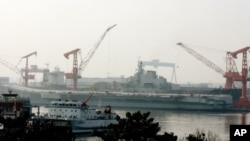China, with its vast territory and agrarian culture, has historically been a continental power. But as the country celebrates its National Day on Saturday, the focus has moved to the oceans, which increasingly are viewed as critical to China’s economic future. China’s renewed emphasis on its maritime territorial claims is making its neighbors wary.
When China unveiled its first aircraft carrier in August, the rest of the world took notice.
Chinese officials repeatedly stress that the country's military intentions - on land or on sea - are benign. They point out that China was the only one of the five permanent United Nations Security Council members not to have an aircraft carrier.
Qu Xing heads the China Institute of International Studies, a government foreign policy advisory body. He acknowledges there are worries about China's intentions because of its growing strength. He said Beijing needs to elaborate its position to the world and stress its determination in maintaining peaceful development.
South China Sea negotiations
Miles Yu, an East Asia and military history professor at the U.S. Naval Academy, said he believes China prefers to keep its intentions ambiguous, which makes it actions all the more unsettling to its neighbors.
Yu stresses that his views are his own and that he does not speak for the U.S. government.
"Well, China's rise with a vengeance - in other words, China believes right now that it is China's time to become the world's dominant power. China has never shied away from that claim," said Yu. "You hear the phrase that the 21st century is the Chinese century - and all these sayings are just a matter of course out of the mouths of ordinary Chinese. But to somebody from outside, particularly somebody from a neighboring country, this sounds very scary because what does it mean specifically?"
Brunei, China, Malaysia, the Philippines, Taiwan and Vietnam all have overlapping claims in the South China Sea. China claims the entire area, which is believed to have vast untapped resources of oil and natural gas.
Although other South China Sea claimants have been holding talks on working together to address their territorial disagreements, China has opposed efforts to internationalize the issue. Chinese officials have said they prefer to solve the disputes one on one.
Although the maritime dispute is under renewed scrutiny this year, Yu said the roots of the conflict stretch back much further.
Roots of a superpower
For hundreds of years, China was at the top of a political system to which other smaller countries paid tribute. Starting in the late 19th century, however, western colonial powers such as Britain, France, Germany, Japan, Russia and the United States became the dominant forces in the region.
Yu said China viewed itself as a victim for many years, and now that its power and influence are rising again, neighboring countries may be nervous that they could bear the brunt of Beijing's historical resentment.
“It's been bullied by all others, particularly in the last 170 or so years, so China right now wants to reclaim its role as the center of the world,” said Yu.
The issue of China being bullied is a strong undercurrent that runs throughout the country's recent history.
Li Jingyu, a professor at Liaoning Normal University's Ocean Economy Research Center, emphasized that the invaders who took advantage of China came from the ocean, and that risk still remains.
He said that from a political and military perspective, China's dream of national safety has not yet been realized. He said the so-called "big powers" came to China from the oceans, and that that risk how not yet been solved yet.
Underscoring trade, defense
Li points to the aircraft carrier as a symbol that China will be able to protect the country in the future.
At the same time, Li said the Chinese government's goal is not to establish hegemony in the seas, but to see the peaceful rise of China in a harmonious sea with friendly neighbors and common development.
American professor Yu said China is undergoing a transformation from what he described as a tentative superpower, to a more confident one. He said the gap is still quite large, but that the sign of a true global power is having a navy whose primary job is to protect the country’s economic interests.
“And for the first time, actually, in China's recent history, the economic and strategic or military goals were specifically and tangibly connected, because before, it was either ideological exportation or competition with the Soviet Union or the United States, in Africa or Latin America,” said Yu.
China demonstrated its willingness to use its navy to protect its economic interests in 2009, when it sent ships to join an international anti-piracy effort off the coast of Somalia. Earlier this year, Chinese military ships were instrumental in helping evacuate about 30,000 Chinese from the increasingly chaotic Libyan capital, Tripoli.
The Center for Strategic and International Studies says China’s trade volume has increased dramatically in the past decade and that most of this trade is carried by ship.




